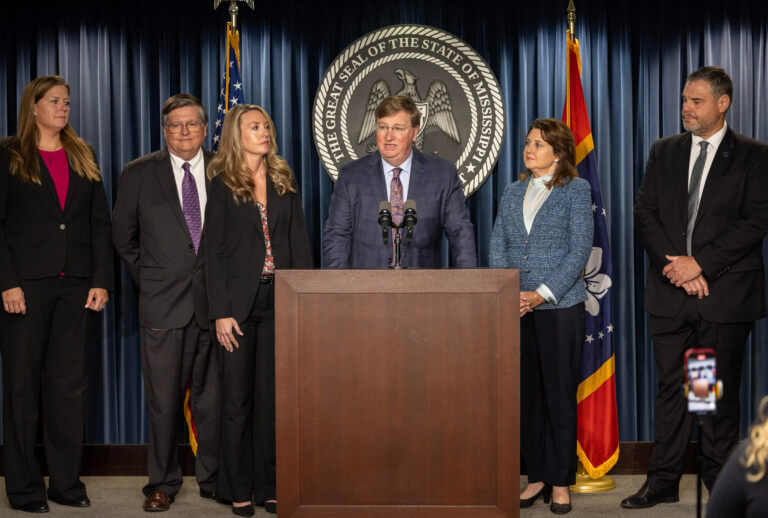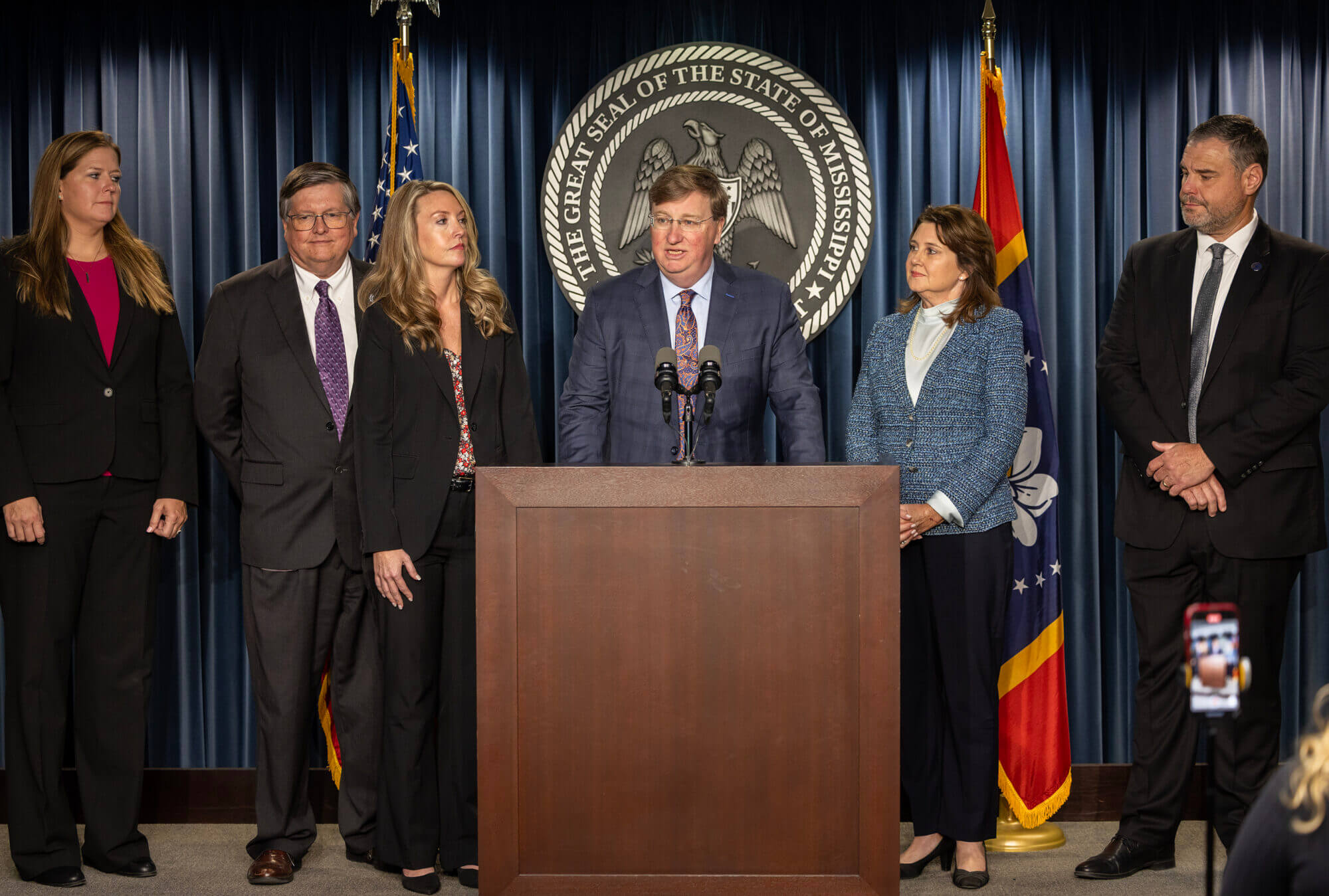

While most states have made public their proposals for a $50 billion federal investment into rural health care, Mississippi is keeping its plan under wraps.
Thirty-two states have made their full application or proposal summaries for the Rural Health Transformation Program available to the public, according to a report from Princeton University’s State Health & Value Strategies Program. Ten states, including Mississippi, have announced but not shared their application, and 8 have not made any details public.
All 50 states submitted applications for the one-time funds, which will be doled out over five years beginning in 2026 as part of a major federal investment into rural healthcare. The federal government has said states may post plans to their websites at their discretion, though the Centers for Medicare and Medicaid Services will not release awardees’ project summaries until funding decisions are made. Awards will be finalized by the end of December.
Gov. Tate Reeves, whose office oversaw the development of Mississippi’s plan, denied Mississippi Today’s public records request for the application. He told reporters at a press conference Nov. 4 the state will work with CMS to determine when it can make all or part of the document public.
“The primary reason for denying the request is to protect sensitive technical and detailed budgeting information that could jeopardize and undermine the competitive nature of the procurement process that must be followed in awarding federal funds,” said spokesperson Shelby Wilcher in an email to Mississippi Today.
Mississippi is expected to receive at least $500 million – and possibly more – as a part of the program, Reeves said Nov. 4. He shared an overview of Mississippi’s plan, which includes conducting a statewide assessment to study rural health, facilitating collaboration between providers, expanding the medical workforce, advancing health technology and closing gaps in care. The plan largely mirrors the broad strategic goals of the federal program.
Heather Howard, a professor at the Princeton School of Public and International Affairs, said states publishing the proposals is important because it allows stakeholders to see the programs they are pursuing and states to share ideas for tackling the widespread challenges rural communities are facing in accessing health care.
“Transparency is always the best practice in government,” Howard said. “And I would say, particularly so given the significant funding at issue and the underlying rural health challenges across the country.”
Concerns about duplication have already risen. Leaders advising on how to spend tens of millions in opioid settlement dollars noted that several of the projects proposed could also be eligible for funding through the Rural Health Transformation Program.
The Mississippi Opioid Settlement Fund Advisory Council is “wanting to be careful not to double-fund when funds are limited,” State Health Office Dr. Dan Edney, a co-vice chair of the committee who also supported the governor in crafting the rural health plan, said at the council’s meeting Nov. 3.
In a letter denying Mississippi Today’s request for the state’s Rural Health Transformation Program, Reeves’ office said the requested records “appear to be confidential under Federal law” until awards are made, citing the same document that says states may post plans to their websites at their discretion.
It also pointed to a state law that exempts public bodies from the Mississippi Public Records Act’s deadlines during procurement. The law does not bar the state from releasing the records, but says it is not required to meet the usual deadlines until contracts are awarded.
“If potential subgrantees are able to gain access to detailed budgeting information for each initiative in the application, they might use such information to inflate their bids and thereby deplete the limited federal funds that are critical to improving health outcomes in rural Mississippi,” said the letter.
States can redact sensitive information or publish a summary of the application to address valid concerns about releasing proprietary or sensitive information, Howard said. Six states have opted to release only a summary of their application as opposed to the full document.
“It’s good that they are sensitive to that, but states have ways to address that,” she said.
The Rural Health Transformation Program was tacked on to President Donald Trump’s tax-and-spending law passed this summer, which cuts federal Medicaid spending. Congressional Republicans added the one-time money for rural health to soften the blow associated with the permanent cuts in rural areas.
The program’s funds will offset just over a third of the estimated $137 billion cuts to federal Medicaid spending expected in rural areas over 10 years, according to analysis from KFF.
In Mississippi, cuts to payments that help hospitals offset low Medicaid payments will amount to a loss of $160 million a year statewide beginning in 2029, Mississippi Medicaid Director Cindy Bradshaw told lawmakers Sept. 24.
Some critics have noted that the program is temporary funding that will not cover the losses rural hospitals are facing. And, the funding is aimed at implementing new programs to strengthen rural health, not making direct payments to hospitals to make up for this difference.
“What we’re seeing is a real interest in workforce development and health technology, which is exciting,” Howard said of applications states have made public. “…But that’s not going to make up for the day-to-day reimbursement cuts that hospitals are reeling from.”
Mississippi’s plan will not include direct financial assistance to hospitals, which the federal government has made clear it will not approve, Reeves said Nov. 4.
Half of the $50 billion program will be distributed evenly among all states with approved applications. The other half will be calculated based on a formula that calculates each states’ rurality, the quality of its application and implementation of policies aligned with the Make America Healthy Again agenda.
Mississippi has recently taken steps to adopt policies that receive higher scores, including reestablishing the Presidential Fitness Test in schools and seeking a waiver to restrict purchases of sugary foods and drinks through the Supplemental Nutrition Assistance Program, or SNAP.
- State fire marshal is investigating troubled Unit 29 at Parchman prison - February 26, 2026
- Mississippi’s Winter Storm Fern losses exceed $107 million, state insurance department says - February 26, 2026
- DNA evidence linked to a Greenville homicide is missing. Now the finger-pointing begins - February 26, 2026